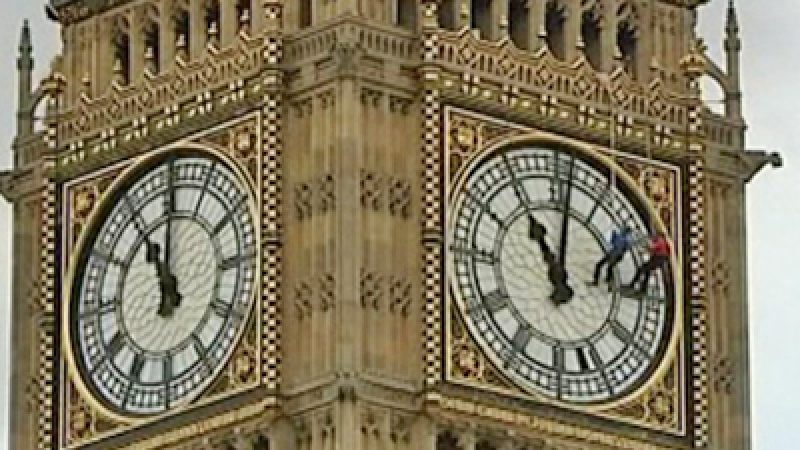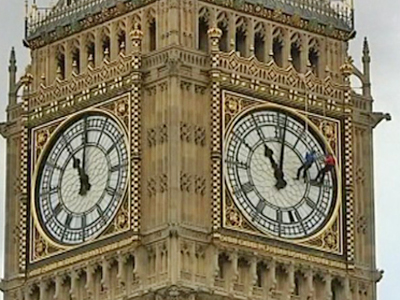
Workers Abseil Down London’s Big Ben Tower

These workers needed a head for heights this week as they abseiled down the tower that houses Big Ben, checking and repairing any damage to the iconic London landmark.
The men wore ear protection as the clock continued to strike as they carried out their work.
Michael McCann, keeper of the Great Clock, explained that a number of environmental factors can damage the clock face.
[Michael McCann, Keeper of the Great Clock]:
„The clock face is made of cast iron frame, bolted together. And where they bolt together there’s a gap as you would expect, and in that gap we can get water, we can get freezing frost and that will damage the clock face. But the Victorians, as we know, were very clever, they were very good engineers and they knew this would happen. So to prevent that they put a small glazing strip over that gap, which seals it from the rain. But unfortunately that sealing strip does fall off from time to time over the years. So the man will be inspecting for them and if there’s any missing he then goes back and gets the glazier and he will actually replace them.“
St. Stephen’s Tower in Westminster, which houses the famous Big Ben bell, stands 315.9 feet tall, while each clock face measures 23 feet across.
A specialist glazier and ‚industrial rope access technician‘ climbed out of a door in the face of the clock, and were expected to abseil down all four faces of ‚The Great Clock‘ during the course of the day to inspect and repair the clock’s external glazing.
However, McCann said the glazier did not have the best head for heights for this particular job.
[Michael McCann, Keeper of the Great Clock]:
„He’s not an ordinary glazier, he’s a special glazier – he does leaded lights, that sort of thing. But he’s not a special man for heights no, so he’s quite nervous at the moment.“
 Foto: NTDTV
Foto: NTDTV


![Pressekonferenz vom Bundeskanzler und schwedischen Ministerpräsidenten Kristersson [Livestream]](https://images-de.epochtimes.de/uploads/2025/01/Thumb-Scholz-Schwedenempfang2-400x225.jpg)
























vielen Dank, dass Sie unseren Kommentar-Bereich nutzen.
Bitte verzichten Sie auf Unterstellungen, Schimpfworte, aggressive Formulierungen und Werbe-Links. Solche Kommentare werden wir nicht veröffentlichen. Dies umfasst ebenso abschweifende Kommentare, die keinen konkreten Bezug zum jeweiligen Artikel haben. Viele Kommentare waren bisher schon anregend und auf die Themen bezogen. Wir bitten Sie um eine Qualität, die den Artikeln entspricht, so haben wir alle etwas davon.
Da wir die Verantwortung für jeden veröffentlichten Kommentar tragen, geben wir Kommentare erst nach einer Prüfung frei. Je nach Aufkommen kann es deswegen zu zeitlichen Verzögerungen kommen.
Ihre Epoch Times - Redaktion